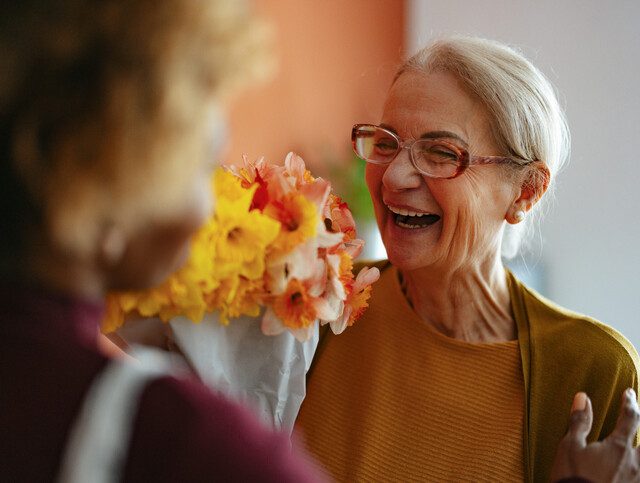Cognitive health is a measurement of how well a person thinks, learns and remembers. Aging is often accompanied by mild changes in cognition. For instance, misplacing things from time to time, such as your phone, glasses or keys, is considered a normal part of aging. While this can be frustrating at times, most people are able to retrace their steps and find the missing item.
Mild cognitive impairment (MCI) and dementia are both terms that signify there is a decline in cognition greater than would be expected for that person’s age, education or development. MCI does not impact the person’s ability to perform everyday tasks, whereas dementia does. If you or a loved one are showing signs of MCI or dementia it is best to consult your healthcare provider.
Let’s say you notice some troubling symptoms and consult a physician. You receive a diagnosis of Alzheimer’s, which is the most common form of dementia. Accepting the diagnosis is often a very hard thing to do and it takes time. Denial and fear are normal reactions, often followed by grief. It is important to take the time you need to accept the news. After that, it is time to start planning.
In this article we will cover the various memory care options that are available for you or your loved one, how to prepare for the care-needs discussion and we will review the memory care services available at Village on the Green, including our state-of-the-art memory care facility.
Understanding Memory Care Options
The CDC describes Alzheimer’s as “a progressive disease beginning with mild memory loss and possibly leading to loss of the ability to carry on a conversation and respond to the environment.” Alzheimer’s and other types of dementia can seriously affect a person’s ability to carry out daily activities. That said, progression of the disease doesn’t happen overnight. Needs change over time and vary from person to person. Because of this, there are several care options available.
Adult Day Centers
Adult day centers offer people with Alzheimer’s and other types of dementia the opportunity to be social and participate in activities in a safe environment. This arrangement is particularly well suited to someone living with Alzheimer’s who has a primary caretaker. An adult day center not only offers the person with Alzheimer’s a chance to socialize, but it also allows the caretaker time to work a day job, run errands, or simply rest and recharge so that they can provide better care.
In-Home Care
In-home care is an option for someone with Alzheimer’s or another type of dementia that wishes to stay in their home for as long as possible. Caregivers who provide in-home care services are often referred to as personal care assistants or home health aides. These caregivers may work full-time or part-time to help the person living with Alzheimer’s complete activities of daily living. Some in-home services also involve medical care given by a licensed health professional. The costs of providing 24/7 in-home medical care for a person with Alzheimer’s can add up fast.
Residential Care
Eventually, a person living with Alzheimer’s or dementia may need more care than can be provided at home. Some people — whether they live alone or with loved ones — may even prefer to move into a communal living environment. Different types of residential care facilities include retirement housing, assisted living, skilled nursing and memory care communities. These spaces provide varying levels of care for those with dementia. Continuing care retirement communities (CCRCs), such as Village on the Green, are growing in popularity and provide access to all levels of care.
For example, many of the residents at Village on the Green join the community by moving into one of our independent living apartment homes or villas. While we always aim to support the most independent living possible for our residents, we acknowledge that health can change over time. We accommodate all levels of living within our community, including memory care for those diagnosed with dementia.
Respite Care
Respite care is an option for caregivers who need a break, whether it be time to take an extended vacation or if there is an emergency situation that prevents them from providing the adequate level of care for a person with Alzheimer’s. Respite care can be provided at home or in a care setting, such as an adult day center or residential facility. The Alzheimer’s Association recommends that you try respite care providers out in a non-emergency situation first. Respite care can provide short-term relief for primary caregivers and is not a permanent care solution.
How to Prepare for the Care Discussion
Whether you are the person diagnosed with dementia or a loved one who is looking to engage in conversation about current and future needs, it’s important to have the conversation about care. Consider what you want to discuss, who should be there and the location of the discussion. If you live alone and are diagnosed with Alzheimer’s there are resources available to discuss options.
On average, a person with Alzheimer’s lives four to eight years after diagnosis, but they can live as long as 20 years, depending on other factors. Discussing care can ultimately relieve pressure and uncertainty for both the caregiver and the person living with Alzheimer’s as time progresses.
Village on the Green’s Memory Care Services
At Village on the Green in Orlando, we believe in taking a personalized approach to memory care. Our state-of-the-art memory care services provide resources and programming for residents living with Alzheimer’s or another type of dementia. On-site amenities include: 18 memory care apartments; an activity room; chef-inspired meals; salon and barber services; housekeeping and laundry; a secure courtyard and garden; and 24-hour security with gated entrance. The memory care wing is part of our recent Health Center expansion, which also includes assisted living residences.
Meet Our Memory Care Team
Village on the Green’s care team includes registered and practical nurses, certified nursing assistants, physical, occupational and speech therapists, a licensed social worker, an activities coordinator, a dietitian and a restorative aide with specialized training in restorative care.
Village on the Green provides access to all levels of care for residents as their healthcare needs change, including those living with Alzheimer’s and other types of dementia. If you’d like to learn more about our continuum of care, please give us a call at 407-682-0230 or fill out the form below.


